|
|
|
Sort Order |
|
|
|
Items / Page
|
|
|
|
|
|
|
| Srl | Item |
| 1 |
ID:
130942
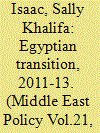

|
|
|
|
|
| Publication |
2014.
|
| Summary/Abstract |
This paper tackles the political and security complications of the Egyptian transition from its inception in January 2011 until the fall of the Muslim Brotherhood president, Mohamed Morsi, in July 2013, with a primary focus on how these complications are of strategic importance to Europe. It starts with inferring Egypt's role in European Union (EU) approaches to security in the Mediterranean, which were acknowledged in the 2003 European Security Strategy and then largely interpreted in the 2004 European Neighborhood Policy. It argues that the old EU democracy-stability dilemma persisted in Europe's approach to the Egyptian transition, especially during Morsi's one-year presidency. In discussing the current political and security complications of the Egyptian transition and how they constitute strategic concerns to Europe, the analysis tackles undermined social cohesion in Egypt due to processes of repolarization in Egyptian society after July 2013; the question of Egypt's porous borders with the Hamas-controlled Gaza Strip; the emergence of the Sinai Peninsula as a jihadist center; and the rising importance of economics in the EU-Egyptian relationship
|
|
|
|
|
|
|
|
|
|
|
|
|
|
|
|
| 2 |
ID:
130940
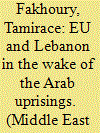

|
|
|
|
|
| Publication |
2014.
|
| Summary/Abstract |
Lebanon is a multisectarian state in which Muslim and Christian groups share political power. The executive elite is composed of a Maronite president, a Shiite speaker of parliament and a Sunni prime minister. The legislature is split 50-50 between Muslims and Christians, and communities enjoy educational and religious autonomy. Two pacts act as regulatory frameworks for these political arrangements: the 1943 National Pact and the 1989 Taif agreement, which put a halt to Lebanon's 15-year civil war (1975-90).
While Lebanon's prewar political system (1943-75) was often framed as a paradigmatic case of consociational or power-sharing democracy,1 most observers today agree that this system is an anarchistic model for the devolution of power. 2 Sectarian3 politics feeds on patronage ties and foreign alliances through which communities vie for control over resources. It further reifies partisanship in external conflicts.
|
|
|
|
|
|
|
|
|
|
|
|
|
|
|
|
| 3 |
ID:
130939
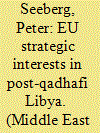

|
|
|
|
|
| Publication |
2014.
|
| Summary/Abstract |
Since the fall of Muammar Qadhafi in 2011, a legitimate monopoly over the means of violence has not been in the hands of the Libyan state. The military confrontation between the regime and what the international media called the "rebels," supported by the NATO no-fly zone, ended in October 2011. However, in 2012 and especially in 2013, Libya witnessed an escalating conflict pitting the democratically elected government and the Libyan state against armed groups and militias. For the EU, this is a challenge to its strategic interests, primarily security in the Mediterranean and secondarily migration and the development of Libya.
|
|
|
|
|
|
|
|
|
|
|
|
|
|
|
|
| 4 |
ID:
130933
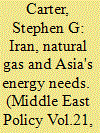

|
|
|
|
|
| Publication |
2014.
|
| Summary/Abstract |
Demand for natural gas in Asia has grown steadily during the past decade and is expected to increase considerably in the next 20 years. This growth in demand has paralleled an increasingly aggressive regime of international sanctions on Iran over its nuclear-weapons program. Considering the importance of maintaining economic pressure and political solidarity in sanctions regimes, the projected growth of demand for natural gas in some of the world's fastest-growing economies is creating both short- and long-term strategic implications for the United States and its allies. With one of the world's largest reserves of natural gas and an enviable geographical location as a likely hub for energy transit, Iran is in an excellent strategic position to benefit economically and politically from this growth in demand. While recent sanctions have dealt a damaging blow to Iran's oil exports and economy, agreement on sanctions on Iran's underdeveloped natural-gas industry has been more tepid, as nations such as Pakistan, India and China, among others, candidly weigh their options to solve increasingly dire short-term energy demand and create long-term energy security. Development of Iran's natural-gas industry to the point at which is it is able to meet demand in these nations would bring in considerable revenue for the regime, potentially enough to offset much of the economic impact of sanctions. Of particular importance to the United States and its allies, then, are answers to the following questions: Does Iran currently have the infrastructure to meet this demand? How long would it take Iran to develop the necessary infrastructure in the event nations that have expressed interest in Iran's natural gas opt against the pressure of sanctions? How likely are the above-mentioned nations to eventually contravene sanctions? How are changes in the global natural-gas industry impacting Iran's potential share of the regional and international market? And is there enough natural gas from other sources available to meet demand in nations like Pakistan, India and China?
|
|
|
|
|
|
|
|
|
|
|
|
|
|
|
|
| 5 |
ID:
130935
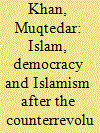

|
|
|
|
|
| Publication |
2014.
|
| Summary/Abstract |
The overthrow of the Muslim Brotherhood's presidency in Egypt by an unprecedented partnership between the army and Tamarod ("rebellion" in Arabic), a grassroots opposition movement, followed by the brutal repression of the Brotherhood, has left observers dazed and puzzled. The speed and savageness with which democracy, and perhaps even the hope for democracy, has been smashed in Egypt was unexpected and harrowing to watch. This episode may cast a long shadow on how Egyptian and regional polities negotiate with endemic authoritarianism.1 It will also have a profound impact on how political Islam, especially in the Arab world, evolves. Some commentators are forecasting the end of political Islam;2 others have limited their obituaries to the Muslim Brotherhood in Egypt.3 Some opine that perhaps the Muslim world is not ready for democracy; others claim the contention that Islam and democracy are not compatible has been vindicated
|
|
|
|
|
|
|
|
|
|
|
|
|
|
|
|
| 6 |
ID:
130941


|
|
|
|
|
| Publication |
2014.
|
| Summary/Abstract |
The Arab Spring may have begun in Tunisia in December 2010 with mass protests that ultimately toppled the regime of Zine El Abidin Ben Ali, but that same month, protesters also gathered in Amman's streets, demanding political change. The Jordanian demonstrations were never as large as those in Tunisia and were certainly not comparable to the mass protest rallies in Egypt's Tahrir Square. They also differed in focus, calling for reform but not for regime change or revolution. Initially, they demanded the ouster of the government of Prime Minister Samir Rifai, and succeeded. But even after the shift in royally appointed governments, protesters continued to gather almost every Friday for the next several years, calling for more reform within the Hashemite Kingdom
|
|
|
|
|
|
|
|
|
|
|
|
|
|
|
|
| 7 |
ID:
130932
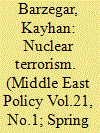

|
|
|
|
|
| Publication |
2014.
|
| Summary/Abstract |
Nuclear terrorism was first identified by the United States as a unique concern at the Washington "Nuclear Security Summit" of April 12-13, 2010. At that meeting, President Obama maintained that access to nuclear weapons by terrorist groups was "the single biggest threat to U.S. security, both short-term, medium-term, and long-term."1 This issue was highlighted again at the Seoul "Nuclear Security Summit," March 26-27, 2012. The U.S. view of this threat as critical and imminent will affect international politics, especially Iran-U.S. relations, from now on. For instance, here is the way the United States views Iran in the context of nuclear terrorism in its 2010 Nuclear Posture Review (NPR): "The United States will not use or threaten to use nuclear weapons against non-nuclear-weapons states that are party to the Nuclear Non-Proliferation Treaty and in compliance with their nuclear-non-proliferation obligations"2 - except the states that the United States deems to be in violation of the NPT: Iran and North Korea. The United States explicitly threatens non-nuclear-weapons states in its official doctrine, emphasizing the deterrent and weaponization aspects of Iran's nuclear program, on the one hand, and refuting Iran's potential to counter nuclear terrorism by excluding Iran from nuclear-security summits, on the other.
|
|
|
|
|
|
|
|
|
|
|
|
|
|
|
|
| 8 |
ID:
130931
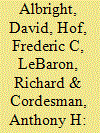

|
|
|
|
|
| Publication |
2014.
|
| Summary/Abstract |
In my 40 years in the region, I can't remember so many big front-page issues. Egypt, Syria, Iraq, Afghanistan and Iran. All are major problems at the same time, and there are lots of doubts about the U.S. role. Traditional allies are expressing concern and in some cases anger, wondering if the United States is actually a reliable ally. Today's topic lies at the heart of many of these concerns. We are very fortunate to have with us today a panel of true Middle East experts who have real-time, on-the-ground experience in the region.
|
|
|
|
|
|
|
|
|
|
|
|
|
|
|
|
| 9 |
ID:
130934
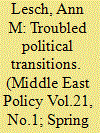

|
|
|
|
|
| Publication |
2014.
|
| Summary/Abstract |
January 14. January 25. February 17. Historic days that marked President Zine al-Abidine Ben Ali's flight from Tunis, the start of the 18-day revolution in Egypt, and the Day of Rage in Libya. President Ben Ali's hands shook as he pleaded for more time to address the public's grievances. Egyptian President Hosni Mubarak played the stern pater familias until he was unceremoniously ushered offstage by senior military officers. Muammar al-Qadhafi threatened to kill the drug-fueled "germs, rats and scumbags"1 who opposed him, but he met a bloody end months later. The overthrow of these powerful autocrats after 23 (Ben Ali), 30 (Mubarak) and 42 (Qadhafi) years of rule cracked sclerotic governing systems and brutal security structures. The uprisings opened up the possibility of futures free from oppression and corruption, futures the people would create themselves. Yet, it is hardly surprising that the transitions remain troubled in all three countries and have failed to meet the expectations of most citizens.
|
|
|
|
|
|
|
|
|
|
|
|
|
|
|
|
| 10 |
ID:
130937
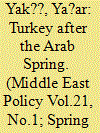

|
|
|
|
|
| Publication |
2014.
|
| Summary/Abstract |
Turkey's attitude regarding developments in the countries affected by the "Arab Spring" varied according to the approach of the ruling Justice and Development Party (Adalet ve Kalk?nma Partisi, AKP) and its perceptions of the countries in question.
In Tunisia, Annahda, a political party that originated from the Muslim Brotherhood (MB) tradition, emerged as the strongest political movement after the fall of the Ben Ali regime. Annahda has an ideological affinity with the AKP, which also has Islamist roots. There is, in addition, a deep-rooted tradition in Tunisia to regard Turkey as a source of inspiration for various reforms. Turkey was, at the beginning of the Arab Spring, referred to by some as a role model. This concept did not acquire much content as time went by, however.
In Libya, Turkey hesitated at the beginning to get involved in the crisis and even wanted to keep NATO out of it.1 Seeing, however, that "a coalition of the willing" was going to intervene with or without Turkey, it made a swift change and participated in the operations with six aircraft and five ships.
When the mainly Shia population of Bahrain wanted to follow the example of the other Arab Spring countries and protest against its Sunni ruler, Saudi Arabia formed a Gulf Cooperation Council (GCC) intervention force, composed mainly of Saudis, and repressed the demonstrations with a ruthlessness comparable to the methods used by the ousted regimes in the other Arab countries. The international community adopted a double standard and kept silent; Turkey went along with this consensus.
Turkey's reaction to the events in Yemen was restrained; it was viewed as a distant country and of low priority on the international agenda. The fact that Saudi Arabia stepped in as the main actor may also have played a role in Turkey's lack of enthusiasm for getting involved more deeply.
|
|
|
|
|
|
|
|
|
|
|
|
|
|
|
|
| 11 |
ID:
130938
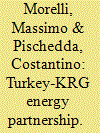

|
|
|
|
|
| Publication |
2014.
|
| Summary/Abstract |
Ten years after the U.S. invasion and two years after the complete withdrawal of American forces from its soil, Iraq faces a number of challenges to its long-term stability and development. These range from corruption to poor public services, from rising terrorist violence to ethnosectarian tensions in the context of a complex power-sharing system. An important, but often overlooked, aspect of Iraq's political scene concerns the dispute between the federal government and the Kurdish Regional Government (KRG) over the management of the country's and the Kurdish region's natural resources and over appropriate revenue-sharing mechanisms. The parties have been stuck in a costly political stalemate for the past few years, as the absence of a federal hydrocarbon law has discouraged international investment in Iraq's natural resources, and oil extracted from KRG-controlled fields has had only intermittent access to international markets.
|
|
|
|
|
|
|
|
|
|
|
|
|
|
|
|
| 12 |
ID:
130936
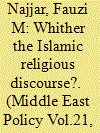

|
|
|
|
|
| Publication |
2014.
|
| Summary/Abstract |
For more than two centuries, Muslims have been struggling to cope with the challenges of the scientific, technological, political and cultural civilization of the West. Modernization has been thrust upon them by colonialism as well as by globalization in general. To modernize has been somewhat inescapable. The more pressing question agitating the Muslim mind has been how to modernize and remain Muslim, as Muhammad Abdou, a leading Egyptian modernist, put it more than a century ago.
|
|
|
|
|
|
|
|
|
|
|
|
|
|
|
|
|
|
|
|
|